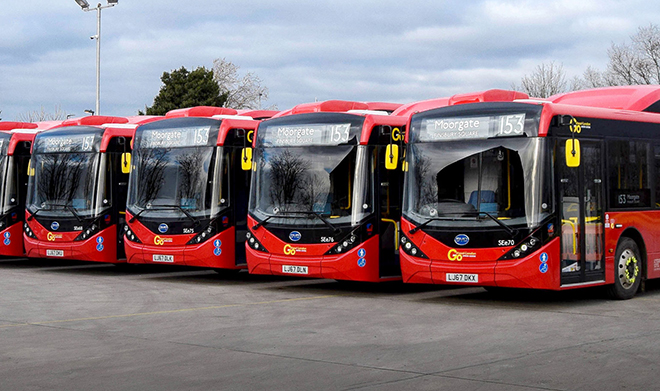The International Energy Agency’s Global EV Outlook is an annual publication that reports on the current state of electric mobility around the world. This year’s report notes the rapid proliferation of plug-in vehicles—from a mere 17,000 in 2010 to some 7.2 million in 2019. The growth has been concentrated in a few regions—47% of the world’s plug-ins are in China—but it is gradually expanding geographically. Nine countries had more than 100,000 plug-in cars on the road in 2019, and market share has passed 1% in at least 20 countries.
One country that has been aggressively deploying electric buses is Chile. In 2017, Metbus, a private bus operator in the capital, Santiago, partnered with Italian utility Enel and BYD to bring two electric 12-meter BYD K9FE buses to Santiago. After a year-long pilot, operating costs were calculated at $0.10/km, compared to a cost of $0.43/km for a comparable diesel bus.
Following the pilot, Metbus worked with BYD and Enel X, an Enel subsidiary, to add an additional 100 BYD K9FE buses in 2019. Each bus costs an estimated $295,000. Enel X financed the buses, and leased them to Metbus for 10 years, after which ownership will be transferred to Metbus. Metbus operates the buses and provides basic maintenance. BYD handles major maintenance operations, including battery packs and electric drivetrains, for a fixed rate of $0.09/km.
The charging infrastructure consists of 100 BYD EVA 080KI AC chargers that deliver up to 80 kW.
The total amount of the agreement between Metbus and Enel X is estimated to be in the range of $40 million. This amount includes the costs of grid upgrades at two charging locations, estimated to have been around $3 million at each depot.
The e-buses operate along Avenida Grecia, a major axis in Santiago. There are 40 new state-of-the-art bus stops, which include free WiFi, USB chargers, bus arrival time displays, solar panels, LED lighting and wheelchair access.
Metbus has now increased its fleet to 285 BYD e-buses, and plans to add 150 more by the end of 2020.
Also in 2017, a similar partnership led by French utility Engie launched a pilot with a Yutong E12 12-meter bus in Santiago. This bus had estimated operational costs of around $0.05/km. Following the pilot, Engie agreed to finance an additional 100 e-buses for two local operators: Buses Vule and STP. The total cost of this deal is estimated at around $30 million, or $300,000 per bus.
The STP terminal will have 13 150 kW DC chargers to operate 25 electric buses, and the Buses Vule terminal at Rinconada, which opened in March 2019, includes 37 150 kW DC chargers to handle 75 buses. The cost per charger is estimated to be between $20,000 to $40,000 per unit.
In March 2020, NEoT Green Mobility financed 25 King Long DM2800 electric 12-meter buses for operator Redbus. The financial arrangements mirror the Engie and Enel business model of providing separate asset ownership for infrastructure and buses to a local transport operator.
Chile’s federal government has set a goal of electrifying the country’s entire bus fleet by 2040.
SEE ALSO: IEA case study: electric buses in Helsinki, Finland
Source: International Energy Agency




















































